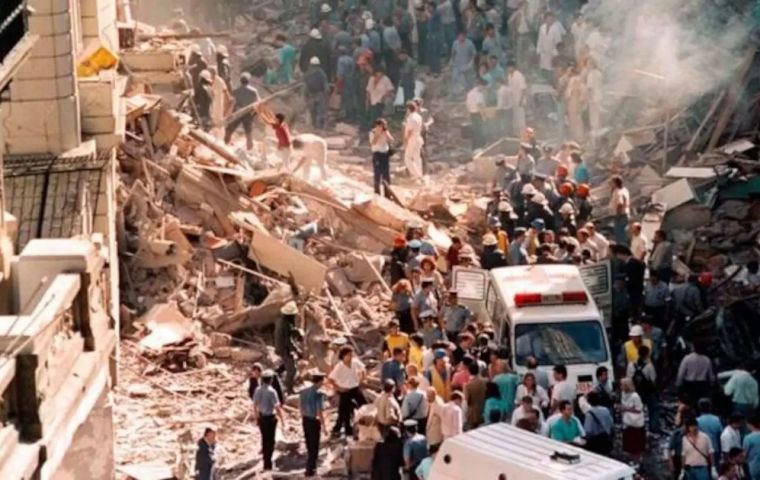MercoPress. South Atlantic News Agency
Argentina: In absentia trial of AMIA bombing suspects to proceed
 The Iranian defendants may still appeal Rafecas' ruling
The Iranian defendants may still appeal Rafecas' ruling Buenos Aires Federal Judge Daniel Rafecas ordered a trial in absentia for ten Iranians suspected of being involved in the 1994 bombing of the Argentine Israeli Mutual Association's (AMIA) headquarters in the Argentine capital, killing 85 people and injuring over 150. The attack has been deemed a crime against humanity, falling under the Rome Statute.
The decision was adopted at the behest of AMIA Unit Prosecutor Sebastián Basso. It targets former Iranian officials and Hezbollah members, alleged to have orchestrated the attack with Tehran's support.
The new developments have been enabled by the newly passed procedural code providing for in absentia trials.
Rafecas underlined the trial’s role in seeking truth and providing a platform for victims, with the process remaining public and subject to appeal.
Rafecas' ruling stated that the suspects were declared in absentia years ago. They are aware that they are wanted, with extradition requests failing repeatedly.
Investigators believe the attack was organized from the highest levels of the Iranian regime, with logistical and operational support from Hezbollah in Argentina and the Triple Border (Argentina, Brazil, Paraguay).
Defendants Ali Fallahijan, Ali Akbar Velayati, Mohsen Rezai, Ahmad Vahidi, Hadi Soleimanpour, Moshen Rabbani, Ahmad Reza Asghari, Salman Raouf Salman, Abdallah Salman, and Hussein Mounir Mouzannar may appeal Rafecas' ruling.
Basso argued that the new special procedure applied to the crime against humanity, which, as such, is not subject to any statute of limitations. If Rafecas' decision is upheld by the Appellate Court, the case will be handed over to an oral court for trial.
“The trial in absentia, however limited it may be, is still a tool that allows, at least to try to know the truth,” Rafecas said in his 148-page ruling. ”A trial does not guarantee certainties, but it does open a possibility (...) for the prosecutor to try to prove what he claims. The possibility for all voices to be heard. The possibility that the facts finally come to light. And sometimes that alone is worth it,” he added while reckoning that clearing the way for a trial in absentia in Argentina was a first.




Top Comments
Disclaimer & comment rulesCommenting for this story is now closed.
If you have a Facebook account, become a fan and comment on our Facebook Page!